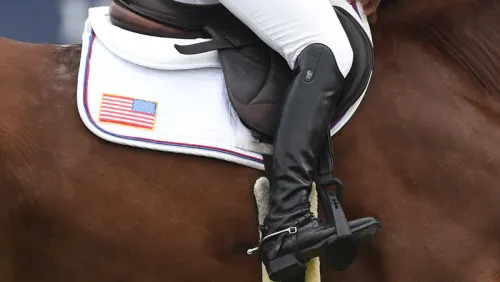On Feb. 25, U.S. Center For SafeSport officials removed Olympic show jumper, trainer and event organizer Ali Nilforushan from the temporary suspension list, six days after suspending him for “allegations of misconduct.”
When placed on the list, Nilforushan maintained his innocence in a public statement on his social media, writing: “The allegations against me are not sexual in nature at all and I completely deny any wrongdoing in this matter.”
He continued, “The incident in question involved a single conversation that lasted less than 5 minutes and took place at a horse show with an individual who appeared inebriated.”
Since being removed from the list, Nilforushan issued the following statement to The Chronicle of the Horse: “I am thrilled to be back at work, supporting all the people and horses that count on me every day. Defending a false accusation has literally resulted in one of the worst weeks of my life as my livelihood and reputation, both of which I cherish and have worked very hard to establish, were unfairly placed in jeopardy. My wife, Francie Nilforushan, and I will be forever grateful for the overwhelming outpouring of support from the equestrian community—a community that very much believes truth should prevail.”
Ali, 45, represented Iran in the 2000 Sydney Olympic Games and in the 2006 FEI World Cup Final (Malaysia). Through Nilforushan Equisport Events, he and Francie run four weeks of premier horse shows at Galway Downs in Temecula, California.
The U.S. Center For SafeSport declines to comment on specific cases, and center spokesman Dan Hill reiterated that he would not comment specifically on Ali’s case.
“Temporary measures are really a tool for the center to keep participants safe while the center looks into a matter,” said Hill. “It’s not a finding. It’s not a conclusion that there was wrongdoing. There are degrees of [temporary measures] and options available.”
ADVERTISEMENT
Not all temporary measures are public. For example, the center may prohibit a specific person from being in the same gym or showgrounds as another person.
“When people see a temporary measure that turns to a suspension permanently because of an investigation, that’s an example of temporary measures working,” said Hill. “When people see a temporary measure that gets lifted, that’s also an example of it working. [A temporary suspension] is not a finding.”
Hill said temporary measures may be taken before the accused or witnesses have a chance to speak to the center, and that the accused is notified at the time or before they are suspended.
“These are tough issues,” said Hill. “There’s no doubt. They’re very sensitive issues. The center is based on fairness—that’s the principle that drives the center.
“What’s the alternative [to imposing a temporary suspension]?” he continued. “Is the alternative that we get a report of something serious, and the center says we need to conduct a thorough investigation before we do anything, so we’re going to let participants get in harm’s way? People would be outraged by that. We do go out of our way in the database to make sure it’s understood that [a temporary measure] is not a finding.”
Hill said he is aware of the criticism and pushback against SafeSport coming from some in the equestrian world.
“Culture shift is tough,” he said. “We’ve seen it in many areas of society where new standards and new levels of accountability cause disruption, and it’s tough. But there should not be an alternative to going back to the way things were.”














